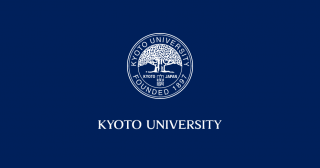On 2 October, Kyoto University hosted a ceremony to celebrate the awarding of the 2018 Nobel Prize in Physiology or Medicine to Tasuku Honjo, distinguished professor and deputy director-general at the Kyoto University Institute for Advanced Study (KUIAS). The award was announced on the previous day for Professor Honjo and one other immunologist, Professor James P Allison of the University of Texas MD Anderson Cancer Center, for their "discovery of cancer therapy by inhibition of negative immune regulation".
In the ceremony, held outdoors in front of the Clock Tower, Professor Honjo and his wife, Shigeko, each received a bouquet of flowers from the administrative staff of the Graduate School of Medicine, as a hearty round of applause rose from the assembled crowd.
This was followed by a press conference featuring the two.
Professor Honjo began by listing some of the things he felt particularly grateful for in relation to his career: his own good health and inquisitive nature, which he said he seemed to have inherited from his parents and Buddhist-priest ancestors, respectively; support from his colleagues, technical staff, secretaries, and family; and his remarkable fortune in having always been helped by circumstances and people to obtain sufficient funding for his work.
Next, delving into the topic of the life sciences, he pointed out that these disciplines address the very core of human existence, and at the same time hold the key to the future of industry. He went on to express pleasure at the fact that his Nobel award seemed to have highlighted the life sciences' application potential, and called on the government to increase investments in related areas. "There is no future for a country that does not invest in the life sciences," he declared.
Ms Honjo, for her part, mentioned that she had majored in science as a university student, and therefore had always appreciated the challenges of research. Because of this, she said, and due to having a baby soon after marriage, she ended up assuming the role of supporter for her husband. The family had to move several times due to her husband's work — from the United States to Tokyo, then Osaka, and then to Kyoto — with the two children changing schools each time. Professor Honjo's receipt of the Nobel Prize, however, brought everyone in the family great joy, she said. "I felt that all my sacrifices had been rewarded."
Asked what her husband is like at home, she shared that his indomitable spirit and penchant for thoroughness are on display in everything he does, concluding that these traits must have been the key to his success as a researcher.

Professor Honjo (right) and his wife receiving bouquets of flowers

At the press conference
Related links
- Tasuku Honjo speaks at a press conference following Nobel announcement (1 October 2018)
https://www.kyoto-u.ac.jp/en/about/events_news/office/soumu/koho/news/2018/181001_2_2.html - 2018 Nobel Prize in Physiology or Medicine awarded to Distinguished Professor Tasuku Honjo (1 October 2018)
https://www.kyoto-u.ac.jp/en/about/events_news/office/soumu/koho/news/2018/181001_2.html - List of publications by Professor Tasuku Honjo
http://www.kulib.kyoto-u.ac.jp/bulletin/1379630?lang=en




